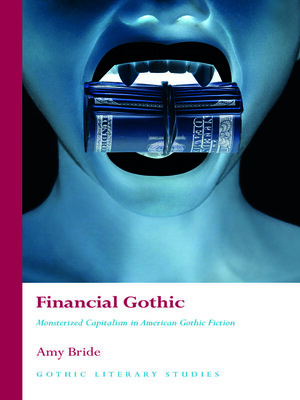
Sign up to save your library
With an OverDrive account, you can save your favorite libraries for at-a-glance information about availability. Find out more about OverDrive accounts.
Find this title in Libby, the library reading app by OverDrive.



Search for a digital library with this title
Title found at these libraries:
| Library Name | Distance |
|---|---|
| Loading... |
Financial Gothic explores the persistent concern of American Gothic literature with finance - and finance as having always been a gothic phenomenon - from 1880 to the present day. The study reads Frankensteinian monsters, haunted houses, vampires and zombies in American literature and film as cultural responses to such twentieth and twenty-first century financial phenomena as the 1929 Wall Street Crash, post-war housing debt, financial deregulation, and the 2008 Credit Crunch. Consideration is also given to the pre-existing consensus on racial readings of American gothic, and how these interpretations of the slave trade can be expanded upon in conversation with their financial contexts. Drawing on contemporary insights into financialised understandings of economics within the humanities, new analysis of finance as an inherently gothic phenomenon, and archival work completed on the Library of Congress's Black History Collection, Financial Gothic highlights an as-yet-unrecognised dimension of haunting and monstrosity within American gothic fiction.|Financial Gothic explores the persistent concern of American Gothic literature with finance - and finance as having always been a gothic phenomenon - from 1880 to the present day. The study reads Frankensteinian monsters, haunted houses, vampires and zombies in American literature and film as cultural responses to such twentieth and twenty-first century financial phenomena as the 1929 Wall Street Crash, post-war housing debt, financial deregulation, and the 2008 Credit Crunch. Consideration is also given to the pre-existing consensus on racial readings of American gothic, and how these interpretations of the slave trade can be expanded upon in conversation with their financial contexts. Drawing on contemporary insights into financialised understandings of economics within the humanities, new analysis of finance as an inherently gothic phenomenon, and archival work completed on the Library of Congress's Black History Collection, Financial Gothic highlights an as-yet-unrecognised dimension of haunting and monstrosity within American gothic fiction.







